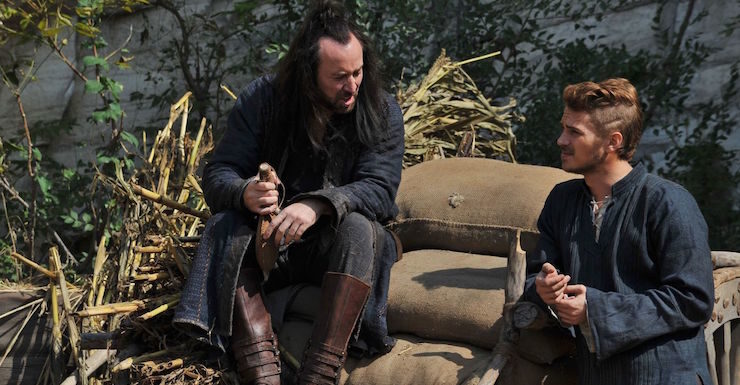Today I’ll be taking a look at Outcast, a 2014 movie that a medieval colleague suggested I watch. He was laughing as he said it. I’m not sure if he wishes me ill or not.
Let’s see what the plot is, according to my iPhone:
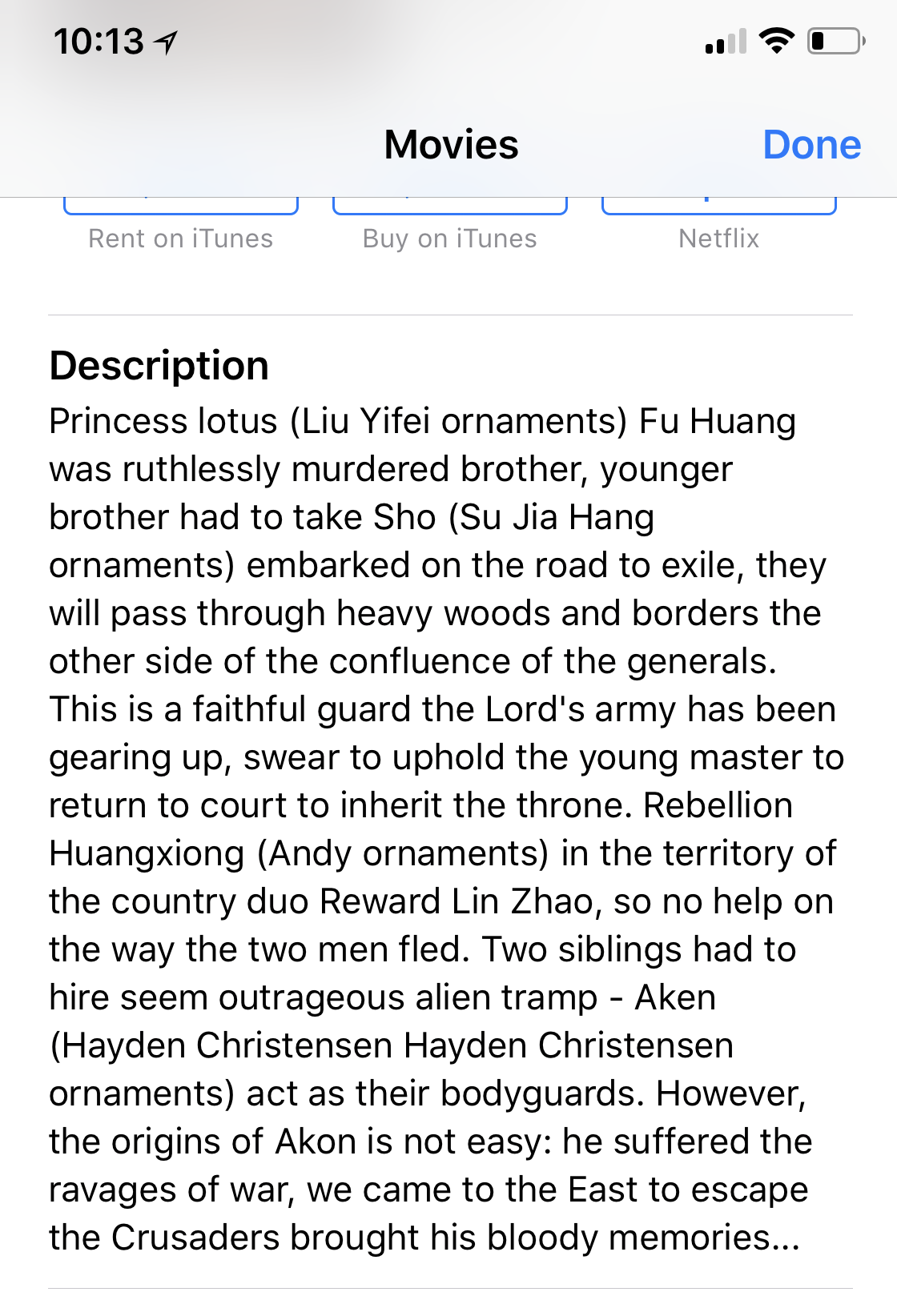
I see. Well, that’s … painful on several different grammatical levels. Gonna have to start the movie up to see if I can sort out something better. Here goes…
Opening shots are of Hayden Christensen dressed up like a crusader (chortle). He’s doing a Hayden Christensen-y voiceover about wishing for forgiveness while exuding very Hayden Christensen-y angst…which reminds me how Hayden Christensen-y he was in the Prequels That Must Not Be Named.
So we aren’t really starting off on the right foot, here.
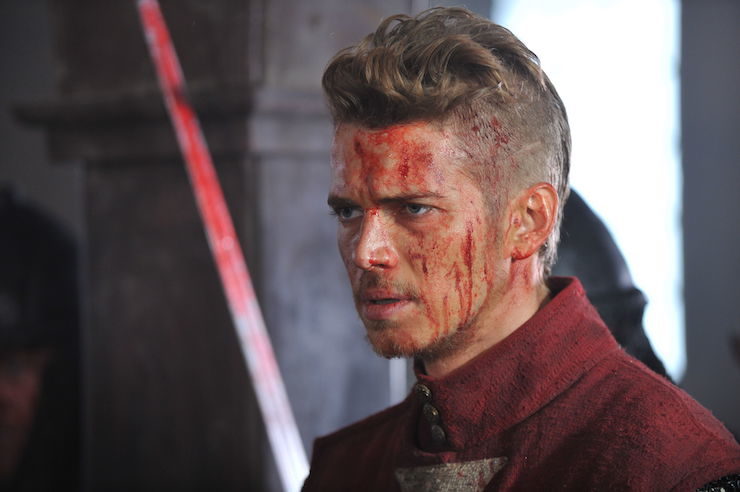
Okay, we’re getting a flashback, I think. Back into—lemme get this straight and confirm via the film’s on-screen info—the “12th century.” Bit of a broad zone there, but fair enough. And our setting is—let’s see now—“The Middle East.”
Right on. Oh so helpful there. Looks like we’ve got ourselves a crusade. That would probably be the Second Crusade (1147-49) or the Third Crusade (1189-92). Don’t know why they couldn’t be bothered to just pick one and give us more specific dating.
But I’m already suspecting that this will be the least of my worries in this film.
So: there’s Hayden Christensen again, and he’s definitely a crusader (stifles laughter). His name is Jacob, and he’s leading an assault on some unspecified palace. He’s not—medieval movie cliché alert!—wearing a helmet. He does have a David Beckham hair-do. He is also one of the only crusaders in a red outfit, which serves to point out to everyone that he’s large and in charge. You’d think this would also make him a prime target for the Muslim defenders of this unspecified palace… but alas, no one shoots him in his helmless head and instead they shoot crossbow bolts (naturally) at everyone around him and it seems like if they had put all those nameless shmucks in redshirts then there’d at least be an amusing meta-thing going on, but instead we’re like three minutes into this film and I’m already pretty damn annoyed.
One of Hayden Angstensen’s soldiers is Nicolas Cage. Seriously. His name is Gallain, and he’s along for the crusading ride on account of—medieval movie cliché alert!—owing a life-debt to Hayden’s father. They’ve been killing Muslims together for awhile now, but for no reason at all today is the day that Gallain decides—in the middle of the assault—that he has had enough. He won’t kill anymore, and he suggests that they instead “go east.” Jacob ignores him and kills more people and takes the palace. With angst. Deus vult and such.
Title card break. The first “t” in Outcast is a sword. Somebody somewhere probably thought that was really damn clever. I’m fighting the urge to bludgeon myself with the remote control.
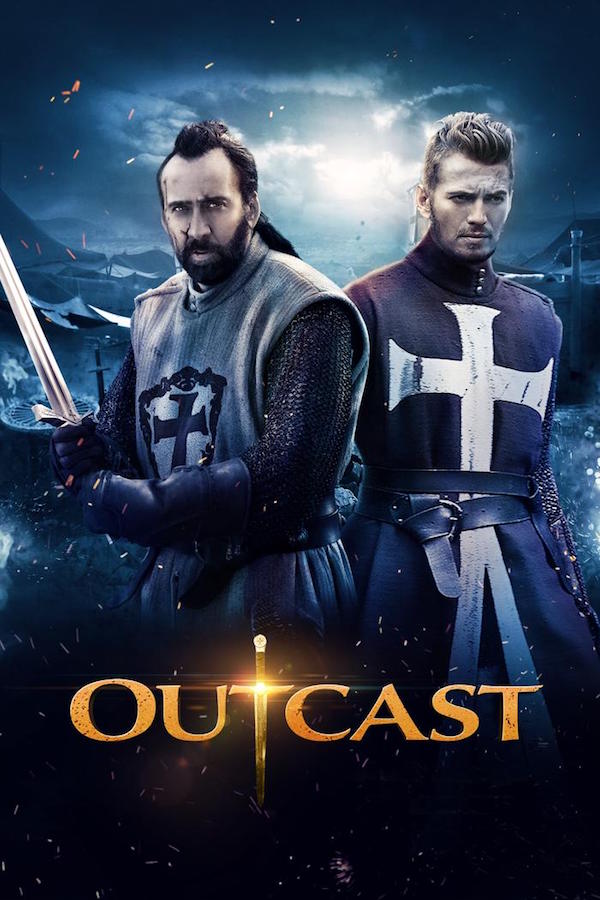
The movie returns, and we’ve skipped to “3 years later.” So… 12th century + 3, I guess? We’re no longer in the “Middle East.” We’re now in the “Far East.” So, like, Asia-ish. Super helpful geography here.
I’m going to say it’s China. The movie is a Chinese-American-Canadian production, so China seems a safe bet. It definitely isn’t Toronto.
There’s a king, and—medieval movie cliché alert!—he’s dying of… well, I’m not THAT kind of doctor, but I’ll give it a shot: it looks like a cough. In point of fact, he appears to be suffering from Cough-cough-I’m-dying-but-I-can-totally-still-talk-and-I’ve-decided-to-use-these-last-gasps-to-set-up-a-plot-point Disease. It runs rampant in bad medieval films.
Why he’s called a king with a kingdom when this is dynastic China and it’s ruled by emperors, I really don’t know. Probably doesn’t matter.
The plot point he coughs out is that he’s going to hand over the kingdom to his wide-eyed youngest son, Zhao, instead of his broodingly militant oldest one, Shing.
The latter of these is played by Andy On, who is doing his damnedest to show that he should’ve been cast as angsty Anakin. He’s on his way to the palace with his troops, who are all—medieval movie cliché alert!—wearing black, in case we needed help determining who the bad guys are gonna be. So the dying king has mere moments to tell his younger son (1) that he’ll be king and (2) that he needs to take the royal seal and ride to some city. The king’s middle child, a daughter named Lian, swears to protect her younger brother on the journey. It’s early still, but Liu Yifei, who plays the princess, is acting circles around the rest of the cast.
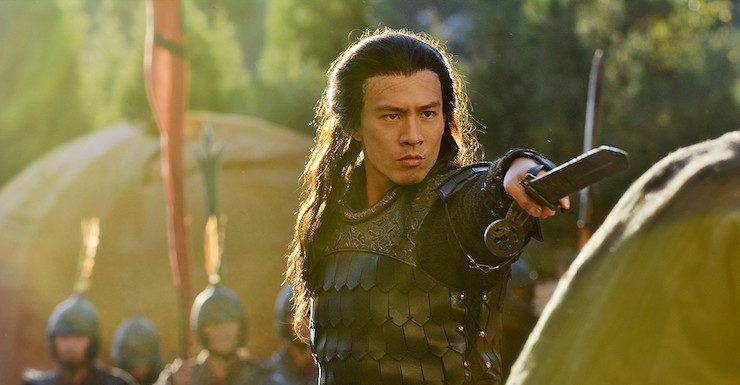
I don’t know why little prince Zhao can’t just hold the royal seal up right here in this palace to show that he’s the king instead of traveling across China to accomplish the task, but I suspect it’s because this movie has another 90 minutes to fill.
Also, we somehow need to link all this up with Nic and Hayden who, just guessing here, are gonna White Savior this kid and the kingdom, with Nic—medieval movie cliché alert!—melodramatically dying in the process. In point of fact, I’m guessing Nic will snuff it by taking a blow intended for someone else (the kid or Hayden, I reckon). Everyone else in the movie dies instantly from their wounds, but by chance Nic’s mortal injury will probably be of the Cough-cough-I’m-dying-but-I-can-totally-still-talk-and-I’ve-decided-to-use-these-last-gasps-to-set-up-a-plot-point wound type. Just shooting from the hip here, but I’m guessing he’ll manage to tell Hayden that he’s forgiven for all that extermination-for-Jesus he did before, back in “The Middle East.”
Place your bets!
Back to the story, in which the king tells his youngest son: “I have made none of these decisions lightly.”
Maybe so. But a more smart-ass son might point out that for all this deep-thought decision-making, ol’ Dad sure did a craptastic job of planning the results: “Couldn’t you have decided to do this like an hour ago or something, Dad? I mean, thanks and all, but way to wait until the last, most dramatic moment possible. God, you’re such a drama queen.”
Anyway, off runs the king-to-be with his sister… and right on cue, in walks his elder brother who ain’t-to-be. And you and I and literally everyone but the idiot king knows that Prince Shing is gonna get rage-sad about being passed over for the throne and then kill the king and look sad-guilty about doing it. Seriously, we’ve all seen Gladiator.
You know what? I should be watching Gladiator right now. But I’m not. I’m instead watching this half-baked dreck and you owe me, people.
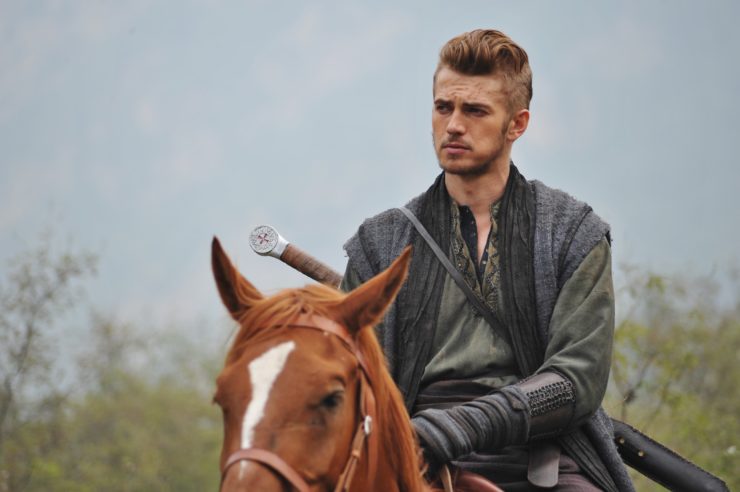
So Prince Zhao and Princess Lian have made it to a remote outpost now. Strider… uh, I mean Jacob … is in the corner of—medieval movie cliché alert!—what looks like an inn’s common room. He’s high on pipeweed opium. When members of Prince Shing’s—medieval movie cliché alert!—“Black Guard” show up and try to kill the kids and take the royal seal, Jacob goes full Rambo and takes them all out. This is immeasurably impressive considering he’s high as a kite.
Of course they beg him to help them. Of course he’s gruff and refusing. And of course he then has a flashback to all that crusading he did… over images of swaying grasses, per Gladiator. So of course he changes his mind and decides to help them.
In our next scene there’s a Black Guard raid and we learn that Jacob is—medieval movie cliché alert!—an impossibly good archer. Because he’s English and Robin Hood was English and well, as he says, he “practiced.”
In the process, this merry band of three picks up a girl named Xiaoli. So now they’re four. We also get some extended bits of dialogue that underscore just how odd it is to have all these Chinese actors and actresses speaking in British accents … except Canadian Christensen, who’s trying to pull off a Scottish one. It’s all quite disturbing.
Also, when are we gonna meet Nic again? He was so bad in those opening scenes that I’m sorta anxious to see him again.
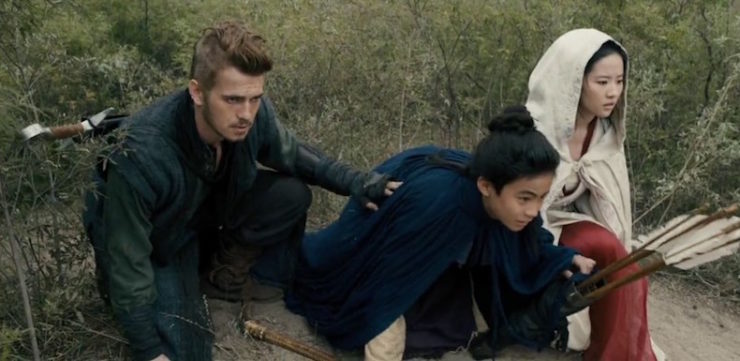
Also, also, Shing gives—medieval movie cliché alert!—a speech to his dead father’s corpse.
Also, also, also, Jacob starts training Zhao to “fire” arrows. Damnit, movie: you don’t “fire” an arrow. That’s something you do with guns. You “shoot” arrows.
There’s betrayal. There’s an obligatory shot of shirtless Shing practicing dual-wielding surrounded by fighters … yep, just like Gladiator.
There’s more drug use.
As bad as things get, though, Jacob fights through and saves everyone because he is indeed the White Savior in this movie, so he’s inevitably way better at fighting than everyone else.
Ugh.
Look, I don’t know how much of the financing of a movie like this depends on the casting of white male actors, but it’s sure hard to see anything good coming from this kind of representation in film (see also my comments on the Viking New World or, to a slightly lesser extent, on Matt Damon in The Great Wall).
Stick through all this nonsense, though, and at last you will get to see the Cage.
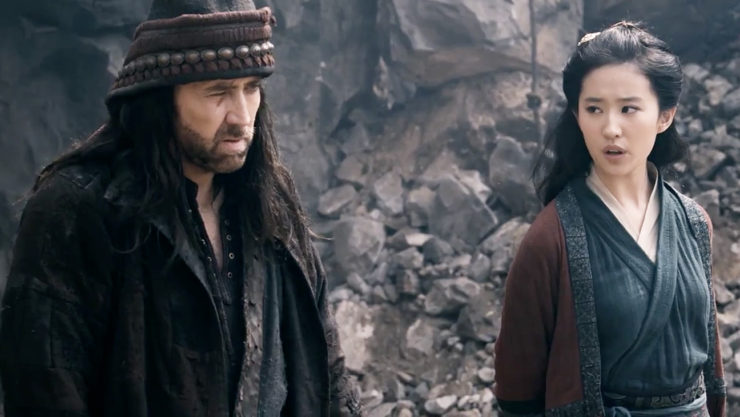
Oh, man.
He’s now a bandit leader known as the White Ghost. He’s gone pirate-eyed and pirate-voiced. I cannot begin to tell you how oddly pleased this makes me. This is bad acting, even on the Cage Scale (TM). Arrrgh and god wills it!
I swear, Cage just doesn’t even care anymore. It’s truly and extraordinarily horrifying … and yet somehow rather beautiful in its way.
It’s a kind of dedicated badness that’s one tick away from camp, and I love it.
Speaking of which, of course Princess Lian falls for Jacob. And of course he gets his forgiveness. And of course there’s a mano-a-mano fight to the death that further rips off Gladiator.
But … the good news is that the acting actually gets worse … which means it strangely gets better.
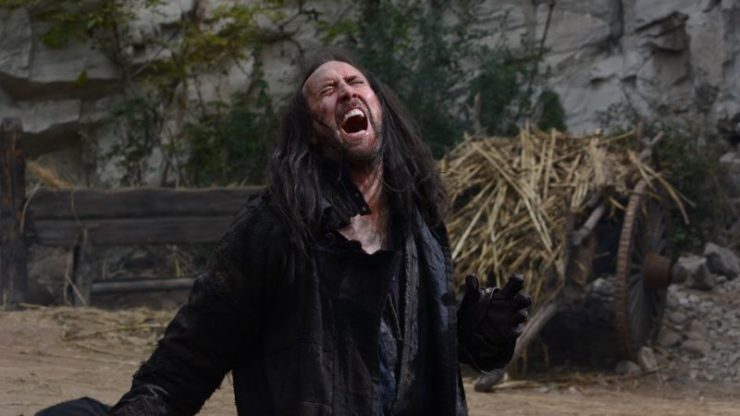
Mike’s Medieval Ratings
Accuracy: “The Far East”
Just Plain Fun: 1 out of 2 Nic Cage pirate-eyes
 Michael Livingston is a Professor of Medieval Culture at The Citadel who has written extensively both on medieval history and on modern medievalism. His historical fantasy trilogy set in Ancient Rome, The Shards of Heaven, The Gates of Hell, and The Realms of God, is available from Tor Books.
Michael Livingston is a Professor of Medieval Culture at The Citadel who has written extensively both on medieval history and on modern medievalism. His historical fantasy trilogy set in Ancient Rome, The Shards of Heaven, The Gates of Hell, and The Realms of God, is available from Tor Books.










